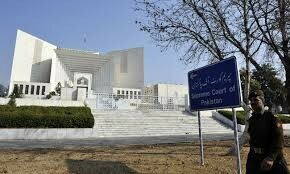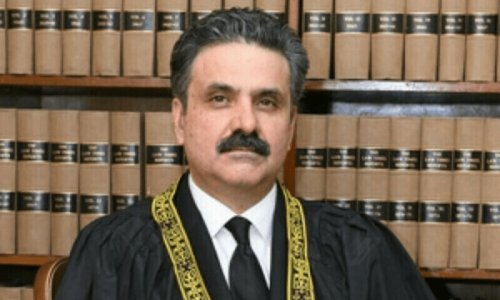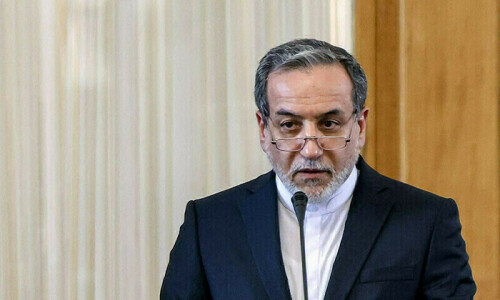ISLAMABAD: The Supreme Court constitutional bench on Friday took up a 2016 suo motu case related to the issuance of arrest warrants by former federal ombudsperson Yasmin Abbasi against Justice Syed Mansoor Ali Shah, who was the senior puisine judge of the Lahore High Court at the time.
Headed by Justice Aminuddin Khan, the six-judge bench intends to determine whether an order by the federal ombudsperson for protection against harassment of women at the workplace can be challenged in high court.
The bench that also comprised Justice Jamal Khan Mandokhail, Justice Mohammad Ali Mazhar, Justice Syed Hassan Azhar Rizvi, Justice Musarat Hilali and Justice Naeem Akhtar Afghan directed the counsel representing the ex-ombudsperson office to come up with complete response on the issue before postponing further proceedings.
Normally, the Presidency has a final say on decisions by the federal ombudsperson.
On Friday, the constitutional bench granted time to the federal ombudsperson office to come up with its response on the query raised by the bench.
Former federal ombudsperson, Justice Mansoor had issued contempt notices to each other
Ms Abbasi did not appear before the court.
At the hearing, Justice Mazhar observed that the former federal ombudsperson continued to appear in her personal capacity at previous hearings, but Justice Jamal Khan Mandokhail said she no longer serves as the federal ombudsman.
The question was whether the federal ombudsman’s action could be challenged in the high court or not, Justice Musarrat Hilali observed.
But Justice Aminuddin Khan observed that if any forum acts without authority, the high court has the jurisdiction to intervene.
Justice Mazhar was of the opinion that the issue at hand has not become infructuous since the arrest warrant was issued against the high court judge and, despite the injunction issued by the high court, the then-federal ombudsperson continued proceeding with the matter.
Justice Mazhar also recalled how both the LHC judge and the ombudsperson issued contempt notices to each other.
The court ordered the counsel representing Ms Abbasi to submit a response with instructions on whether the office intends to continue with the matter or not and then postponed further hearing for the time being. The bench also heard other pending cases and disposed of or adjourned these cases.
Background
On May 11, 2016, then Chief Justice of Pakistan (CJP) Anwar Zaheer Jamali, while taking suo motu notice on a media report that the ombudsperson had issued arrest warrants for the LHC judge, summoned the ombudsperson and suspended the purported arrest warrants.
Ms Abbasi, the federal ombudsperson at the time, had not only issued arrest warrants but also directed the Punjab police chief to ensure the appearance of the judge before her office.
Interestingly, she issued the warrants only a day after she tendered an unconditional apology for her ‘contemptuous’ conduct during an in-camera hearing in the chambers of Justice Shah, who had stayed her from functioning as the federal ombudsperson.
A former Sindh High Court judge and ex-law secretary during the PPP government, Ms Abbasi had to quit the high court in the backdrop of a July 31, 2009, judgement, declaring the Nov 3, 2007, state of emergency imposed by Pervez Musharraf illegal and unconstitutional.
She was also the subject of an inquiry committee that held her responsible for the missing record and documents relating to the reviving of graft cases worth $60 million by the Swiss authorities against ex-president Asif Ali Zardari.
On Nov 27, 2013, Ms Abbasi filed a reference with President Mamnoon Hussain, requesting to invoke Supreme Judicial Council (SJC) and try ex-CJP Iftikhar Mohammad Chaudhry as well as six other judges, who had issued restraining orders on Nov 3, 2007, asking the armed forces and the government officials not to implement Musharraf’s emergency rule and barring the judges from taking oath under the Provisional Constitution Order.
Published in Dawn, November 16th, 2024
















































